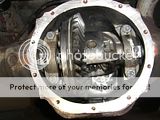XJFREK
NAXJA Forum User
- Location
- Left of center...
Okay, I've searched, but unfortunately, there's a lot of threads that contain "RTV". I'm trying to install a lubelocker on my 8.25, but the last place to remove my diff cover (either Jeep or the local 4wheel parts) used like a half inch bead that oozed everywhere. I got a gasket scraper, but the plastic edge didn't do much and the razor blade is definetely leaving scratches. I've read of using a wire wheel, but the only wire wheel I have is steel so I'm not sure about that. How does everybody who posts how-to's of doing this get their cover and case so clean? Is there a solvent I should be using? I was thinking of using some pumice hand cleaner and a kitchen dish scrubber but wanted to get some opinions. I already have some paint thinner and brake cleaner. I apologize if this has been covered elsewhere but after searching 5 pages of nothing pertaining to my problem I just couldn't do it anymore! Any ideas would be appreciated. TIA,
A.
A.

